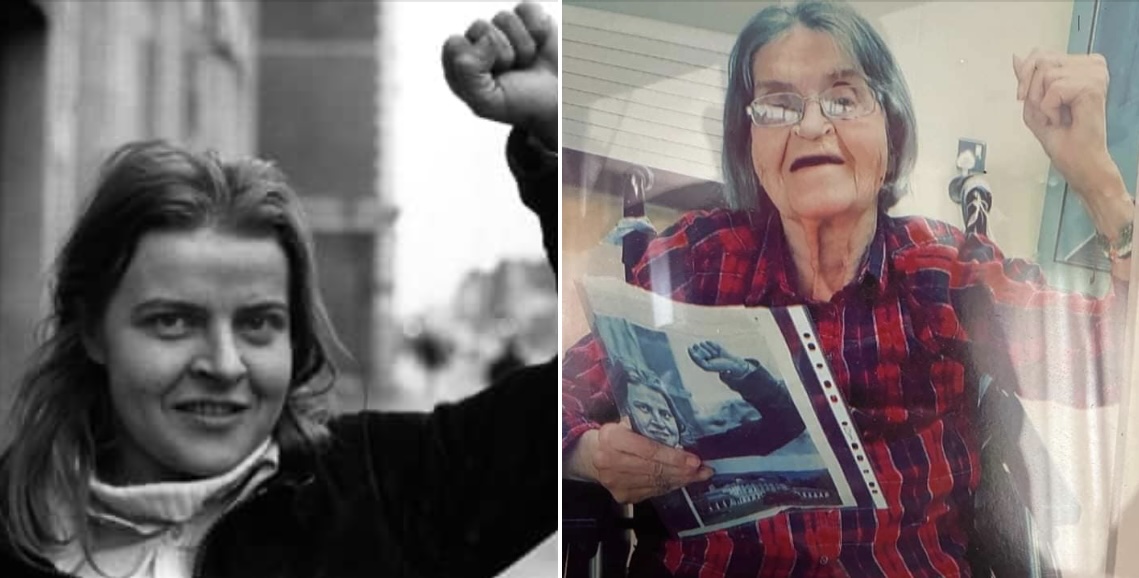
The death has occurred of IRA legend Rose Dugdale, weeks before a movie covering her extraordinary life is due to be released.
Born into a wealthy English family, Rose Dugdale devoted most of her life to the Irish cause before her death last weekend at the age of 83.
Ms Dugdale’s life and politics have long since fascinated the media and an international audience, baffled that a young English ‘heiress’ and highly qualified academic became a dedicated and active member of the Provisional IRA.
She took part in a number of daring and imaginative IRA actions including a helicopter attack on a Crown Force installation in the border town of Strabane, and a fundraising mission which targeted the art collection of a British baronet.
She was imprisoned in 1974 while pregnant, and sentenced to nine years in prison.
Following her release from Limerick Prison in 1980, Dugdale resumed her IRA activities and also campaigned vigilantly for the release of Irish prisoners on hunger strike.
In her later years, Rose Dugdale was quoted as saying that she hoped that she had “played a part in the success of armed struggle” and that she respected “what had been done in the Good Friday Agreement”.
Accolades came in from across the republican spectrum after news emerged via lifelong comrade Jim Monaghan that she had passed away in a nursing home in Dublin.
Dublin Sinn Fein councillor Daithí Doolan said: “She was a true revolutionary who inspired others. She dedicated her life to Irish freedom.
“Our thoughts are with her friends and family. I hope the memories give you some comfort at this sad time.”
Dublin Mid West TD Mark Ward said: “Very saddened to hear of the passing of my old teacher Dr Rose Dugdale. I still have the postcard Rose sent me after I first got elected in 2019 when she was still telling me to go further and reach my full potential.”
Former MEP Martina Anderson said: “Rose taught me a lot and I will never forget her. Proud to call Rose a comrade and friend.”
Veteran journalist Eamonn Mallie pointed to parallels between her and Countess Markievicz, who turned her back on England to took part in The Easter Rising.
The 1916 Societies said “Rose was a committed revolutionary, anti-Fascist, anti-Racist and internationalist who left an indelible mark on those who met her. May she Rest in Power. Ar dheis dia go raibh a hanam dhílis”
Born into a wealthy family in Devon, in the south-west of England, Rose was a self-proclaimed tomboy. In an interview for Sinn Fein, she spoke fondly of her upbringing:
“I had a marvellous life. It’s certainly safe to say that money was never a great shortage.”
She attended Miss Ironside’s School for Girls in Kensington and her family home was in Chelsea. In 1959, she studied at St Anne’s College, University of Oxford and in the US for a Master’s Degree before returned to England where she taught economics and obtained a doctorate in Philosophy.
She was heavily involved in the demonstrations against the Vietnam War and in the working-class movements in Tottenham, north London, a community with high poverty rates and a huge Irish population.
The Bloody Sunday massacre had a profound effect on her and spurred her decision to join the republican armed struggle.
“There was a struggle going on right on my doorstep in Ireland and there was never any doubt that I had to be involved. When I got off the boat in Belfast, I saw the British Army on the streets in their uniforms with their high-tech weapons. I saw British troops raid a set of flats and I found it horrifying. I became anxious to get involved in the armed struggle,” she said.
Her main concern in prison had to do with the ordinary prisoners.
“They lived in appalling circumstances and we could do very little to help them. The authorities treated them terribly and drove some to suicide. For them a prison sentence of a few months was horrible; as republican prisoners, we knew why we were there — we were prepared for it.”
Her time in prison shaped her participation in the movement upon her release.
“The fact that I was an ex-prisoner gave me a certain status within the Republican Movement. There had always been an attitude that I was from a strange background, from the monied classes. I was considered an oddball and a maverick.”
Soon after being released from prison, Rose joined Sinn Féin.
“My background had me believe that armed struggle was the only way forward but the revolutionary army that was the IRA had achieved its principal objective, which was to get your enemy to negotiate with you. They did that with amazing skill and ability and I can’t help but respect what was done in terms of the Good Friday Agreement.”
She expressed no regrets about her decision to leave behind a comfortable life and take part in the Irish struggle.
“I did what I wanted to do. I am proud to have been part of the Republican Movement and I hope that I have played my very small part in the success of the armed struggle.”
![[Irish Republican News]](https://republican-news.org/graphics/title_gifs/rn.gif)
![[Irish Republican News]](https://republican-news.org/graphics/title_gifs/harp.gif)

